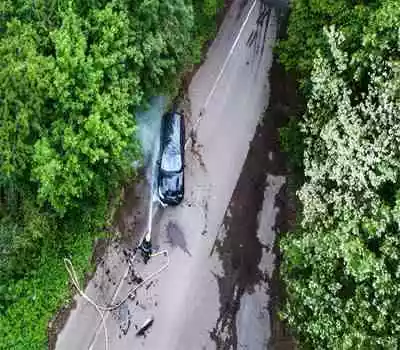Real estate easements are not uncommon, and they are usually not a problem. In most easements, the right of one party to legally use the owner’s land for a specific purpose does not create issues. However, in some cases, easements can get you into trouble.
Easements and their uses can vary depending on the situation. Easements on your property may allow utility companies to enter your land for maintenance, which is generally not considered problematic or disadvantageous. Another typical example might be easements that enable neighbors to pass in and out of your property to get to their property. However, even though the easement itself may not be a problem, liability for accidents that occur there may become troublesome.
What Is an Easement?

An easement is a legal right that allows easement holders to use someone else’s property for specific and limited purposes. Therefore, like the neighbor example above, neighbors who cannot enter their property by other means can use the easement to enter and exit, but not for any other purposes.
An easement holder may not occupy land or conduct business on the owner’s property. They also cannot prohibit others from using the land unless the use directly interferes with the easement holder’s use.
Also, if the easement holder legally complies with the easement clause, the owner cannot exclude the easement holder from their land. Although most easements are agreed upon, if another entity needs to use your property publicly for a longer period, an easement by prescription might then be created.
It is also important to understand the difference between dominant real estate and service real estate in the easement. The dominant estate is the parcel of real estate that uses the easement, and the servient estate is the specific land that is subject to the easement.
Who Is Liable for An Accident On An Easement?
It is well-known that a property owner may be responsible for accidents that occur on their property, but who is responsible for the accident if it occurs on an easement? Unfortunately, the answer is not straightforward. In the final analysis, the issue of liability related to easements generally boils down to the language that the agreement contains with respect to resolving liability issues.
The language of the easement contract can be confusing, in which case a court may consider the parties’ intentions in determining liability. This can involve evaluating the circumstances that existed when the easement was created. In some situations, it may be found that the easement is used for purposes not specified in the contract, which means that the dominant property may have violated the property rights of the service property and should be held liable.
In many cases, the easement holder (the beneficiary of the easement) can be held responsible for a dangerous situation resulting from an accident caused by negligence. However, if both parties benefit from the easement and are aware of any hazardous situation and take no action to prevent accidents, liability can become ambiguous.
Who Is Responsible for the Security and Maintenance of Easements?
To determine whether a party failed to fulfill its duty of care to you in the easement, you should first understand which party has the duty of care: the easement holder or the party granting the right-of-way in the easement. This is different from a typical homeowner liability claim, in which the owner often bears responsibility.
Due to the easement, the property owner may not be responsible for accidents on the land involved in the easement. Because a party other than the owner has the legal right to use the relevant land, that party can take legal responsibility for the safety, care, and maintenance of the land and accidents.
If a utility company uses the easement, the utility company or local government may assume legal responsibility for maintaining the land. The utility company can be responsible for cutting low branches, keeping cables clear of debris, preventing fire hazards, and taking other steps to keep the area reasonably safe.
However, for all other types of easements, including the right to use the property granted to neighbors or private individuals, maintenance remains the owner’s legal responsibility. Therefore, if the easement does not involve a utility company, the owner can be liable. Otherwise, the utility company may be held responsible. However, if the easement holder damages the property, they are legally obliged to restore it to its previous state.
Easement accidents are more difficult to legally resolve than typical liability claims. If you or a loved one becomes injured on an easement, especially as a result of a motor vehicle crash, it can be a good idea to contact an experienced San Antonio Premises Liability Lawyer at Khattar Law, PC